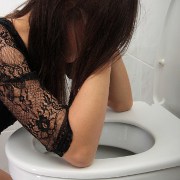 Photo: Getty Images
Photo: Getty Images
People often think of bulimia as a teenage girl’s way of overindulging and then feeling guilty about it. This is far from the truth. Eating disorders are not only common, but prevalent among women of every age, and alarmingly, many in their middle years are suffering tremendously from this condition.
Eating disorders are less about indulgence and guilt as they are about taking back the reins. Even though the results are incredibly unhealthy and sometimes fatal, the thrust behind eating disorders is valiant in its own way -- it is the drive to make your life completely within your power, to change what you want to change without any interference.
Bulimia, the sister of Anorexia, is about control. Especially in instances where one feels they have lost control of certain aspects of their lives, eating to excess and then “getting rid of it” is a way of controlling not only how much one is eating but also how one’s body responds and digests that food.
To say “I will eat exactly as much as I feel like eating,” is to go against the dictates of all social norms with regard to food as well as dietary guidelines and calorie counting. You get to decide when you are full or even if you choose to eat well beyond fullness and, you get to decide if you keep that food or make it go away.
It’s powerful stuff for women who feel that in other aspects of their lives they are floating and bobbing, buffeted by winds of change and circumstances beyond their control.
Life changes such as kids growing and changing, kids having issues, empty nest syndrome, divorce, illness and death in the family, career issues, money worries -- all of these can contribute to a sense of disorientation and a loss of control.
In middle age, too, many women are feeling remarkably insecure about aging -- noticing for the first time that not only is it difficult to keep up with the societal standards of fitness, thinness and beauty, but that when it comes to the twenty–somethings, they are now completely out of the running. This sense of invisibility or no longer being in the sexually charged, beauty queen dance of youth is shocking and traumatic for many women.
Also, even middle-aged women are now beauty queens in their own right. There is a sense that we must age gracefully and in some ways, cease aging altogether. If you are a mother of a young woman, being mistaken for her sister is the height of flattery.
Why? Wouldn’t we want to be seen as mothers, as aging women, as wise women? But this is not the world we live in at the moment.
As with any eating disorder, if you are using food in ways that are not psychologically, physically or emotionally healthy, there are counselors, centers and clinics available to help you. You are not alone and eating disorders are not age specific.
Sources:
Eating Disorders at Middle Age Part 1
Reprinted from Eating Disorders Review
By Katherine Zerbe, MD, and Diana Domnitei, BS
March/April 2004 Volume 15, Number 2
Retrieved from the internet on October 14
http://www.bulimia.com/client/client_pages/newsletter23.cfm
Old Problem, New Victims: More middle-aged women suffering from eating disorders as they strive for an image. By: JANICE GASTON JOURNAL REPORTER
Published: May 26, 2009. Retrieved from the internet on October 14, 2011
http://www2.journalnow.com/news/2009/may/26/old-problem-new-victims-more-middle-aged-women-suf-ar-139890
Aimee Boyle is a regular contributor to EmpowHER
Reviewed October 14, 2011
by Michele Blacksberg RN
Edited by Jody Smith





Add a Comment1 Comments
It's a horrible and completely incorrect stereotype to suggest that all people with bulimia are that way because of a need to have control. This is just so wrong, its psychology from a different century that sits aside Freud! It's horrifying to see this myth perpetuated by those who work in the industry.
April 7, 2015 - 5:34amThis Comment